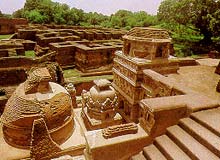
Page-1
|Page-2
|Page-3|Page-5|Page-6
|Page-7
|Page-8
|Page-9
| Page-10
| BaKhabar  Download pdf Download pdf
|
| Of
Biharis and Bihar --- By S.G. Jilanee <sjila_104@hotmail.com>* A nostalgic account of the
place the author left long ago carrying lots of hope in his
new home in Pakistan ... read on ....
Though much neglected in
recent times, Bihar is the only state in India whose glorious past has
no compeer in the entire subcontinent. It is a crucible of different
faiths. Here was born Rama’s consort Sita. And Rama came to compete for
her hand, winning her after successfully stringing the bow that her
father Raja Janak had set as a condition.Here Prince Siddhartha Gautama received Enlightenment and became the Buddha and Mahavira, the founder of Jainism, was born near its present capital, Patna. Also born in Patna were the fifth Sikh Guru Govind Singh and the great Muslim Sufi saint Makhdoom Kamaluddin Yahya Maneri. Pataliputra (present day Patna) was the seat of the glorious Mauriya Empire in 500 BCE, which extended into Afghanistan. That is why there were Buddha statues at Bamiyan. It boasted a residential university at Nalanda and received pupils and visitors from distant places, including Fa Hien and Heun Tsang from China.  Until its Chota Nagpur Division was separated to become Jharkhand, Bihar was also richest in minerals; -coal, iron and mica. In the nineteenth century, long before the struggle for independence had begun, Maulana Inayat Ali was recruiting, training and sending batches of fighters to join Syed Ahmad Barelvi’s jihad against the British in the North-West Frontier Province. His home in Patna was the staging centre for the recruits. In punishment for the “rebellion,” Inayat Ali was transported to the Andamans. His entire property was confiscated. His family was driven out of their home with only the clothes they were wearing. Not even a “needle” they could take away with them. Yet, when the property was put up for auction there was no bidder, -not even a non-Muslim. So the British government built the office of the Patna City Municipality. Biharis, both Muslims and Hindus, are plain people, not used to cunning and guile. If they subscribe to a cause they go into it with all their heart and soul. In 1942, during the Quit India Movement for example, Bihar was the only province with worst incidents of sabotage and violence against government property Biharis, both Muslims and Hindus, are plain people, not used to cunning and guile. If they subscribe to a cause they go into it with all their heart and soul. In 1942, during the Quit India Movement for example, Bihar was the only province with worst incidents of sabotage and violence against government property.  Similarly, in 1938, Barrister Syed Abdul Aziz, president of the Bihar provincial Muslim League, sold away his sprawling mansion, -the Dilkusha Palace and his mica mine to host the 26th session of the All India Muslim League. With the Exhibition and Fraser Roads on either side and the wide race course road in front, the Dilkusha Palace covered several acres of the choicest property in the city. In political field, Bihar threw up Syed Hassan Imam as president of the Indian National Congress and Dr. Rajendra Prasad as the first president of India, besides, Jagjwan Ram, Maulana Shafi Daudi, Dr. Syed Mahmood, Prof. Abdul Bari and other luminaries. In their eating habits and dress Bihar Muslims are closer to the Bengalis because Bihar and Bengal were united until 1912. Women wear sari. The staple food is rice. The language they speak may be called Bihari Urdu with many new words that are not recognized in the established Urdu lexicon. Yet the importance of at least two words Biharis have contributed to enrich Urdu, is undeniable. One of the words is “bhaat” for cooked rice as distinguished from chawal for uncooked rice. In standard Urdu both cooked and uncooked rice are called chawal.  Badhna is another. Standard Urdu describes both the utensil with a spout and a firm base and the one with a rounded off bottom as “lota.” But it is the latter kind that is true lota. It is made invariably of brass and used mostly by Hindus to draw water from a well or boil water or milk etc. The one with the spout is made of any material including plastic. It is exclusively used by Muslims for toilet or pouring water for ablution. Biharis, therefore, call it “badhna” to distinguish it from lota. It is time the ahle zaban shed their snobbery and recognized the worth of the Bihari Urdu in enriching the language.)   |
Bakht
Khan: Winner of a lost battle –
Part 3
… By Asma Anjum*
A much
garlanded and battle hardened veteran of Afghan wars, with huge
handlebar moustache and sprouting sideburns…. Known personally to
several of the British officers. [Part-1] || [Part-2]
 Bakht Khan informed the king that Prince Khizar and others were stashing away the taxes collected from the city traders and due to this salaries of the army could not be paid. Prince Khizar was asked to return the booty. The commoners were pleased with him while the Mughal princes vowed vengeance. Undoubtedly Bakht Khan was a man of the world but he was not at all, worldly. He frequently failed to decipher his detractor’s nasty plans and eventually became a victim to their malice. The Neemuch brigade-his force- was well-known for its valor; but the two of its generals Ghaus Khan and General Sidhari Singh [supporter of Mirza Mughal] parted ways, from Bakht Khan, as they couldn’t digest the fact that, an officer of the similar rank as theirs should get so much importance from the King. During the battles he was left alone to fend for himself. A most ridiculous charge of his being a British spy also came along. All this put him under great pressure and he had to issue a statement denying all these charges. Whether it was failure to capture the army bastions at Alipur, Manali Bridges and the Ridge and almost all the failures were wrongly attributed to the General. Zafar too now was infected with doubt and the devious designs of his foes resulted in Bakht Khan’s removal as Governor General by the end of July. A Court of Administration was established to run the affairs of the Mughal Darbar. The General and his Bareilly brigade kept their distance from it but their assaults grew weaker and the tremendous pressure that he was able to put on the British began to diminish. Dalrymple remarks, “…the end of Bakht Khan’s military system brought instant relief to the British on the ridge”. [16]. It is indeed saddening that such lowly games of selfishness and rivalry did the good General in and ultimately caused the struggle for freedom, a catastrophic damage, giving a boost to the enemy. Richard Barter joyously announced that, “And so, when we were scarcely able to stand, the attacks ceased, as if by a dispensation of Providence, and gave our force the repose they so much needed.”[17]. The one man who possessed the potential for defeating the enemy was thus, rendered impotent. As no intelligence about the success of the good General’s methods reached the court and Delhites, it led to huge misgivings about his military forays. Resentments, against this good soldier soon began to build up. As mentioned earlier, he was accused of being a British stooge himself. His own colleague from the Neemuch Brigade Sidhari Singh accused him thus. Other former co-workers too were not far behind. Gauri Shankar [who was himself a British spy] and Talyar Khan, on 20th August, arranged for a Sikh to proclaim that Bakht Khan provides all information about the court happenings to the enemy. But the truth was found out and the witness was rejected for his false claims. The General himself issued a public statement denying this in the presence of Mirza Mughal and other army generals. The ever eternal quintessential factors of jealousy envy and contempt did this great warrior in. Quite perceptibly his disenchantment began to grow. He became more cautious but continued to be at the forefront of the war and the biggest headache for the British. He marched towards Najaf Garh separate from the Neemuch brigade as his own soldiers refused to take orders from him (and resultantly was smashed by their rivals). Like before, the General was unjustly blamed for this fiasco, as well. Nevertheless Bakht Khan still remained defiant. He was unrelenting and rejected Zafar’s suggestion of opening the gates of Delhi, if the British could not be defeated. He elaborated on some new strategies and it was quickly reported by the spies present at the court to the Gora Sahibs. Needless to add this rendered his plans useless. His failures thus began mounting up. Yet he succeeded in defeating the opponents at the Delhi Gate even in those final hours, and kept a strong vigil at the Ajmeri Gate till the last moments of the war. Despite his failures, more due to the non co-operation of his team than his own faults, what he did achieve was the delay in recapturing of Delhi by the British, as long as he could. The erstwhile Dilli would have been rounded up, quite early in the day, had it not been for the efforts of General Bakht Khan Rohilla. Memorial for British soldiers at Delhi Ridge. No memorial for Indian soldiers though. His military achievements despite the hostilities he faced were amazing; be it capturing three hundreds of British horses taking supplies to their masters, or one of his final determined attacks with his Bareilly and Neemuch troops, which forced the British to make a hasty retreat, from Hindu Rao’s house. Bakht Khan’s advance up to the house of Hindu Rao was no mean achievement; it threatened to cut off the British troops from their camp.[18] Had he been supported efficiently by his own people at the time, his success rate would have been much higher. Miyan Muhommad Shafi, in his famous work, Pehli Jang-e-Azadi-Waaqeyaat wa Haqaayeq, blames this sorry state of affairs on the conspiracies hatched against Bakht Khan by the unfortunate and unreasonable Mughal Princes, who conspired against him, unaware of their approaching terrible end. He says, “The courtiers created havoc each and every time and put blame on him for everything going wrong, without providing him with any kind of general support. All this and the corruption at the court and among the army rank and noncompliance of the troops, disheartened this most able of the fighters, Bakht Khan and after being relieved from his various significant positions , he got reduced to taking care of his own original regiments alone. This turn of events and colossal difference of opinions, among the different elements at the court, led eventually to the downfall of Delhi, the arrest of Zafar and slaughtering of his sons, not to mention hundreds and thousands of Delhites being butchered and displaced, forever.”[19] But in the mayhem of 1857 mutiny what was more tragic perhaps, was the ruin of Shehar e Dilli and its uniquely rich Ganga –Jamuni Tehzeeb. It died forever.  * Asma Anjum (Khan), a social reformer, is exploring the partition of India with a view to understand the largest political divide of muslims in the 21st century. She can be contacted on asmaanjum.khan@gmail.com |
|
4
Home
| About
Us | Objective
| Scholarship
| Matrimonial
| Video
Library | Projects | Quran
Resources | Lend
a hand
|